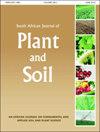南非自由邦东部保护性农业下前茬作物序列对小麦生长发育的影响
IF 1.1
Q3 AGRONOMY
引用次数: 0
摘要
保护性农业(CA)提倡促进可持续种植。在南非东部自由邦省,以前的作物序列对CA下旱地小麦生长发育的影响知之甚少。采用交叉试验设计,评价了小麦在25个夏季作物和25个冬季作物种植序列后的反应。收获指数、降水利用效率和氮素农艺效率表明,生物量产量比籽粒产量更可靠,是生殖期水分和氮胁迫的结果。最有利于小麦生物量产量的5个最佳序列依次为:高粱×玉米、向日葵×干豆、向日葵×玉米、大豆×大豆和玉米×玉米(7.1 ~ 7.8 tha−1);休耕×野豌豆,休耕×小麦,休耕×休耕,野豌豆×饲料燕麦,小麦×燕麦用于冬季作物(6.5-7.4 t / h)。在分级参数中,只有蛋白质含量受冬作物序列的显著影响。一个3年的周期,包括两个季节后的小麦和之前的作物序列,不足以彻底测试非生物胁迫因素,以确定旱地小麦生产的最佳作物序列。本文章由计算机程序翻译,如有差异,请以英文原文为准。
Impact of preceding crop sequences on wheat growth and development under conservation agriculture in the eastern Free State, South Africa
Conservation agriculture (CA) is advocated to promote sustainable cropping. Little is known about the impact of preceding crop sequences on the growth and development of dryland wheat under CA in the eastern Free State Province of South Africa. In a criss-cross experimental design, the response of wheat planted after 25 summer and 25 winter crop sequences was evaluated. Biomass yield was a more reliable indicator than grain yield as a consequence of water and nitrogen stress in the reproductive phase as indicated by harvest index, precipitation use efficiency and nitrogen agronomic efficiency. The five best sequences that favoured wheat biomass yields were, in decreasing order: grain sorghum × maize, sunflower × dry bean, sunflower × maize, soybean × soybean, and maize × maize for summer crops (7.1–7.8 t ha−1); and fallow × vetch, fallow × wheat, fallow × fallow, vetch × fodder oat, and wheat × oat for winter crops (6.5–7.4 t ha−1). Of the grading parameters, only protein content was influenced significantly by the winter crop sequences. A single 3-year cycle comprising wheat after two seasons with preceding crop sequences was insufficient to test abiotic stress factors thoroughly to establish with certainty the best crop sequences for dryland wheat production.
求助全文
通过发布文献求助,成功后即可免费获取论文全文。
去求助
来源期刊

South African Journal of Plant and Soil
Agricultural and Biological Sciences-Plant Science
CiteScore
1.90
自引率
11.10%
发文量
32
期刊介绍:
The Journal has a proud history of publishing quality papers in the fields of applied plant and soil sciences and has, since its inception, recorded a vast body of scientific information with particular reference to South Africa.
 求助内容:
求助内容: 应助结果提醒方式:
应助结果提醒方式:


